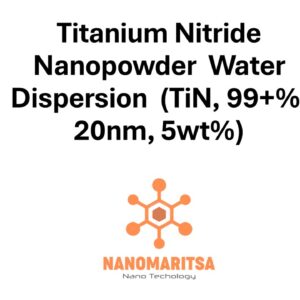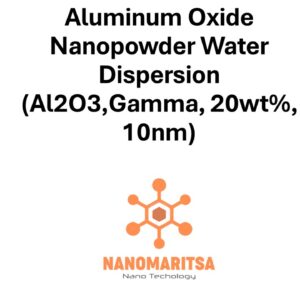Titanium Carbide Water Dispersion (TiC, 99+%, 40-60nm, 10wt%)
€144.00
Titanium Carbide Water Dispersion (TiC, 99+%, 40-60 nm, 10 wt%) is a water-based suspension containing high-purity titanium carbide (TiC) nanoparticles. Titanium carbide is a refractory ceramic material known for its excellent hardness, high thermal conductivity, and good wear resistance, making it useful in various industrial and scientific applications. Below are the key details of this material:
1. Composition:
- Titanium Carbide (TiC):
- Titanium carbide is a ceramic material that exhibits high hardness, excellent wear resistance, and good thermal conductivity. It is often used in hard coatings and as a reinforcing material in composite materials.
- Purity (99+%):
- The 99+% purity indicates that the titanium carbide nanoparticles are of very high quality, containing minimal impurities. This ensures consistent performance and reliability in demanding applications.
- Particle Size (40-60 nm):
- The nanoparticles have a size range of 40 to 60 nanometers, providing a balance between high surface area and particle stability in suspension, which is ideal for various applications, including coatings and composite materials.
- Concentration (10 wt% in Water):
- The dispersion contains 10% by weight of titanium carbide nanoparticles suspended in water, making it suitable for various industrial applications where a moderate concentration of nanoparticles is required.
- Water-Based Dispersion:
- The titanium carbide nanoparticles are suspended in water, which makes this dispersion environmentally friendly and easy to handle compared to solvent-based formulations. It also enables easier integration into water-based systems.
2. Key Properties:
- High Hardness:
- Titanium carbide is one of the hardest known materials, with a hardness comparable to that of diamonds and other superhard materials. This makes it ideal for use in abrasive and wear-resistant applications.
- Wear Resistance:
- TiC is highly resistant to wear and abrasion, which makes it particularly useful for coatings on cutting tools, machinery components, and in abrasive environments.
- High Thermal Conductivity:
- Titanium carbide has excellent thermal conductivity, allowing it to effectively dissipate heat, which is valuable in high-temperature applications.
- High Melting Point:
- TiC has a high melting point (around 3,200°C), which makes it ideal for use in high-temperature environments where other materials might degrade.
- Chemical Stability:
- Titanium carbide is chemically stable and resistant to oxidation, corrosion, and many aggressive chemicals, making it suitable for use in harsh environments.
- Electrical Conductivity:
- TiC is electrically conductive, which makes it useful in electronic applications, such as electrodes or conductive coatings.
3. Applications:
- Coatings:
- Wear-Resistant Coatings: TiC is used as a hard coating for cutting tools, drill bits, and industrial machinery to improve wear resistance and extend the life of components.
- Thermal Barrier Coatings: Due to its high thermal conductivity and stability, TiC can be used in coatings for applications requiring thermal management, such as turbine blades and high-performance engine components.
- Composite Materials:
- TiC nanoparticles are often incorporated into composite materials to enhance their mechanical properties, including strength, hardness, and wear resistance.
- Aerospace and Automotive:
- TiC coatings are applied to components in the aerospace and automotive industries to increase durability, wear resistance, and performance at high temperatures.
- Semiconductors:
- TiC can be used in semiconductor applications as a conductive material or in coatings to protect electronic components from wear and high temperatures.
- Cutting Tools and Machining:
- Titanium carbide is widely used in the manufacture of cutting tools, abrasives, and wear-resistant components, where its hardness and wear resistance are crucial.
- Energy Systems:
- TiC is used in energy systems, such as fuel cells and other high-performance applications, due to its chemical stability and high thermal conductivity.
- Catalysis:
- TiC nanoparticles are also being researched for use in catalytic processes, where their high surface area and thermal properties are beneficial.
4. Advantages:
- Superior Hardness and Wear Resistance:
- The extreme hardness of TiC makes it ideal for use in applications where materials are subjected to high wear and abrasion.
- Thermal Stability and Conductivity:
- TiC has excellent thermal properties, enabling it to withstand high temperatures without degrading. Its high thermal conductivity also helps dissipate heat in thermal management applications.
- Chemical Resistance:
- The chemical stability of TiC makes it resistant to oxidation and corrosion, making it suitable for use in harsh environments, including high-temperature and chemically aggressive settings.
- High Purity:
- The 99+% purity ensures that the nanoparticles exhibit consistent and reliable properties, which is especially important in precision applications.
- Water-Based Formulation:
- The water-based nature of this dispersion makes it safer and more environmentally friendly compared to solvent-based systems. It also makes the material easier to handle and integrates well into water-based processes.
5. Handling and Storage:
- Handling:
- Stir or shake the dispersion before use to ensure uniform distribution of the TiC nanoparticles in the water.
- Wear appropriate protective equipment (gloves, goggles) when handling the dispersion, especially when concentrated, to avoid direct contact.
- Storage:
- Store the dispersion in a cool, dry place, away from direct sunlight and excessive heat to prevent changes in the dispersion properties.
- Ensure the container is sealed to avoid evaporation or contamination.
- Safety:
- While titanium carbide is generally safe to handle, it is advisable to avoid inhaling the particles or getting them in the eyes. Handle the dispersion in a well-ventilated area.
Titanium Carbide Water Dispersion (TiC, 99+%, 40-60 nm, 10 wt%) is a high-performance material that combines the exceptional hardness, wear resistance, and thermal stability of titanium carbide with the ease of a water-based dispersion. It is ideal for use in coatings, composites, and applications requiring high wear resistance, thermal conductivity, and chemical stability. Its high purity and small particle size make it particularly useful in demanding applications, including cutting tools, aerospace, automotive, and energy systems. The water-based formulation makes it more environmentally friendly and easier to handle than solvent-based alternatives.
| Measurement (ml) | 100 ml, 500 ml, 1000 ml |
|---|
Related products
-
Metal Oxide Dispersions
Silicon Nitride Nanopowder Water Dispersion (Si3N4, 99+%,10wt%,15-30nm)
0 out of 5(0)SKU: MN07NPD0116€144.00 This product has multiple variants. The options may be chosen on the product page -
Metal Oxide Dispersions
Fe2O3 Iron Oxide Nanopowder Water Dispersion (Alpha, 99.9%, 300nm, 20wt%)
0 out of 5(0)SKU: MN07NPD0122€256.00 This product has multiple variants. The options may be chosen on the product page -
Metal Oxide Dispersions
Titanium Nitride Nanopowder Water Dispersion (TiN, 99+%, 20nm, 5wt%)
0 out of 5(0)SKU: MN07NPD0117€144.00 This product has multiple variants. The options may be chosen on the product page -
Metal Oxide Dispersions
Aluminum Oxide Nanopowder Water Dispersion (Al2O3,Gamma, 20wt%, 10nm)
0 out of 5(0)SKU: MN07NPD0102€80.00 This product has multiple variants. The options may be chosen on the product page






